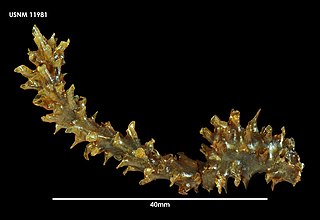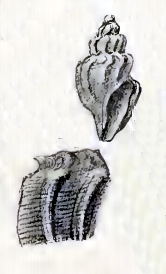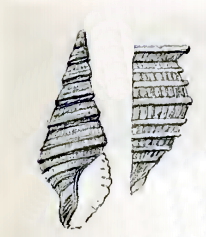Related Research Articles

Hemichordata is a phylum which consists of triploblastic, enterocoelomate, and bilaterally symmetrical marine deuterostome animals, generally considered the sister group of the echinoderms. They appear in the Lower or Middle Cambrian and include two main classes: Enteropneusta, and Pterobranchia. A third class, Planctosphaeroidea, is known only from the larva of a single species, Planctosphaera pelagica. The class Graptolithina, formerly considered extinct, is now placed within the pterobranchs, represented by a single living genus Rhabdopleura.

Pterobranchia is a class of small worm-shaped animals. They belong to the Hemichordata, and live in secreted tubes on the ocean floor. Pterobranchia feed by filtering plankton out of the water with the help of cilia attached to tentacles. There are about 25 known living pterobranch species in three genera, which are Rhabdopleura, Cephalodiscus, and Atubaria. On the other hand, there are several hundred extinct genera, some of which date from the Cambrian Period.

The Gauss expedition of 1901–1903 was the first German expedition to Antarctica. It was led by geologist Erich von Drygalski in the ship Gauss, named after the mathematician and physicist Carl Friedrich Gauss.
Ascoseira is a monotypic genus of seaweed in the brown algae. The single and type species, Ascoseira mirabilis Skottsberg, is a large parenchymatous macroalgae, and is endemic to the Antarctic Ocean. Ascoseira is assigned to its own order. The alga grows in subtidal waters at depths of from 3 to 15 meters.

Conorbela antarctica is a species of sea snail, a marine gastropod mollusk in the family Pseudomelatomidae, the turrids and allies.

Typhlodaphne purissima is a species of sea snail, a marine gastropod mollusk in the family Borsoniidae.
Nacella concinna is a species of sea snail, a true limpet, a marine gastropod mollusk in the family Nacellidae, one of the families of true limpets.

Fuegotrophon pallidus is a species of sea snail, a marine gastropod mollusk in the family Muricidae, the murex snails or rock snails.

Liotella crassicostata is a species of sea snail, a marine gastropod mollusk in the family Skeneidae,.
Calliostoma modestulum is a species of sea snail, a marine gastropod mollusk in the family Calliostomatidae.
Margarella achilles is a species of sea snail, a marine gastropod mollusk in the family Calliostomatidae.
Margarella subantarctica is a species of sea snail, a marine gastropod mollusk in the family Calliostomatidae.
Margarella tropidophoroides is a species of sea snail, a marine gastropod mollusk in the family Calliostomatidae.
Lissotesta impervia is a species of sea snail, a marine gastropod mollusk, unassigned in the superfamily Seguenzioidea.
Lissotesta notalis is a species of sea snail, a marine gastropod mollusk, unassigned in the superfamily Seguenzioidea.

Cephalodiscus is a genus of hemichordates in the monotypic family Cephalodiscidae of the order Cephalodiscida.

Lorabela pelseneeri is a species of sea snail, a marine gastropod mollusk in the family Mangeliidae.

Mangelia cingulata is a species of sea snail, a marine gastropod mollusk in the family Mangeliidae.
Pleurotomella bathybia is a species of sea snail, a marine gastropod mollusk in the family Raphitomidae.
Cephalodiscus solidus is a sessile hemichordate belonging to the order Cephalodiscida.
References
- ↑ Andersson K (1907) Die Pterobranchier der Schwedischen Sudpolar-Expedition, 1901-1903. Wissenschaftliche Ergebnisse der Schwedischen Sudpolar-Expedition. Stockholm. pp. 1-122.
- ↑ Swalla, B.J.; van der Land, J. (2020). "Cephalodiscus densus". WoRMS. World Register of Marine Species . Retrieved September 17, 2020.
- 1 2 3 4 Ridewood, W. G. (October 1921). "On specimens of Cephalodiscus densus dredged by the 'Challenger' in 1874 at Kerguelen Island" (PDF). Annals and Magazine of Natural History. 8 (46): 433–440. doi:10.1080/00222932108632603. ISSN 0374-5481 – via Biodiversity Heritage Library.
- 1 2 3 Schiaparelli, S.; Cattaneo-Vietti, R.; Mierzejewski, P. (2004-11-01). "A "protective shell" around the larval cocoon of Cephalodiscus densus Andersson, 1907 (Graptolithoidea, Hemichordata)" (PDF). Polar Biology. 27 (12): 813–817. doi:10.1007/s00300-004-0661-x. ISSN 1432-2056 – via ResearchGate.
- ↑ McClain, Craig. "Hemichordata (Peanut Worms)". The Story of Size. Archived from the original on 20 February 2020. Retrieved 2023-06-10.